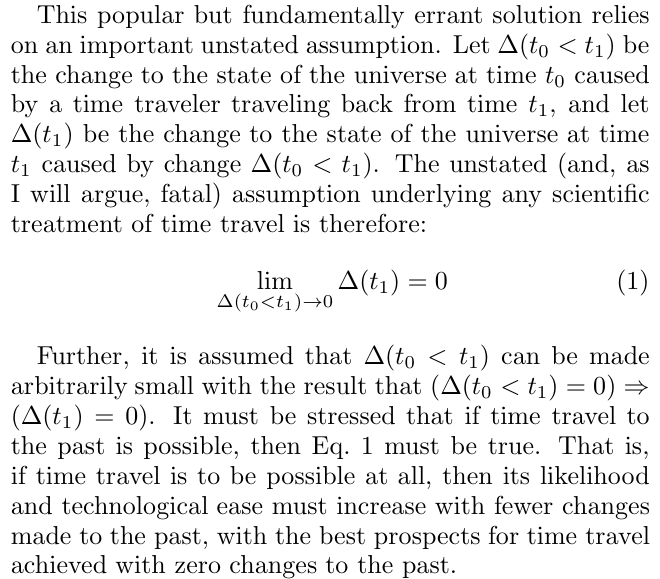Author:
(1) Andrew Knight, J.D. ([email protected]).
Table of Links
III. UNIDENTIFIED ASSUMPTION
In nearly every account of time travel in which some aspect of the past is changed, it is implicitly assumed that a corresponding or commensurate change would occur to the present. Certainly, chaotic amplification – i.e., the so-called “butterfly effect” – would likely yield larger and more unexpected changes to the present than we might hope.[3] Still, it is tempting to believe that changes to the present depend only on changes to the past, and the magnitude of changes to the present would be commensurate with the magnitude of changes to the past.
For example, the so-called grandfather (aka matricide) paradox, in which a time traveler kills one of his ancestors, is widely regarded as a physical limitation to the possibility of time travel. Further, because of the sensitivity of nonlinear dynamics to the precision of initial conditions, it is often (though not always) recognized that even seemingly insignificant changes to the past could result in temporal paradoxes. Hawking [9], among others, asserted that such a paradox can be resolved, and the possibility of time travel into the past maintained, as long as “when you did go back [in time], you wouldn’t be able to change recorded history.”

Indeed, if Eq. 1 is correct, then a hopeful time traveler might simply plan to travel back in time and make as few changes as possible – ideally zero changes – to prevent the possibility of changes to the present (including any accompanying time paradox). After all, even the tiniest measurable change to the past might chaotically amplify – a la the grandfather paradox – in a way that prevents the time traveler from choosing to time travel, or even from existing. In other words, if the hopeful time traveler could be certain to make exactly no changes to the past, then he would presumably be guaranteed no changes to the present.
Is this notion tenable? No. First, being present in any form in the past requires making physical changes that would chaotically amplify over time. Even passive observation requires the absorption of photons by one’s retinas. It is hard to imagine how one might time travel into the past and perceive any aspect of that experience without interacting in some physical form with his surroundings, and these interactions would necessarily influence the future. Second, as I will argue below, Eq. 1 is false.
This paper is available on arxiv under CC BY 4.0 Deed license.
[3] Indeed, changing the initial conditions of three gargantuan black holes by an amount smaller than the Planck length would still, given enough time, render their evolutions entirely unpredictable [13].

